In Hong Kong, ‘zero COVID’ brings small businesses to their knees
Small business owners are facing the third year of the pandemic with no clear end in sight to forced closures, curfews.
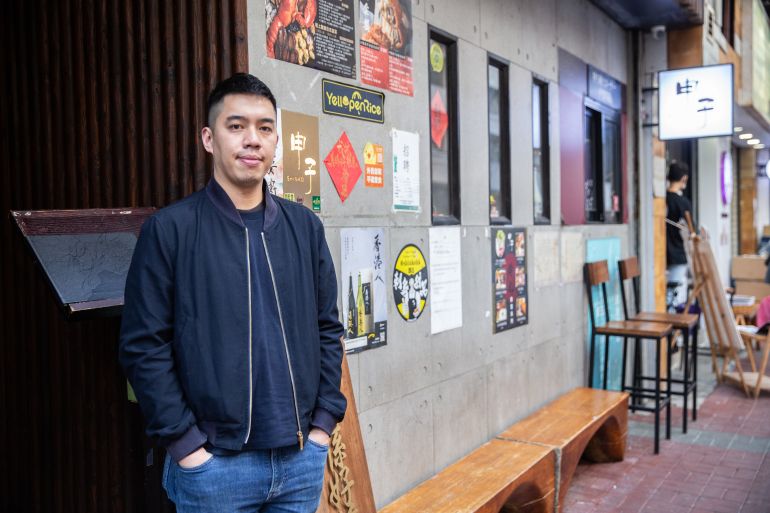
Hong Kong, China – When Pinky Yeung secured a 1,400-square-metre (16,000 sq ft) retail space in Hong Kong’s prime shopping district of Tsim Sha Tsui in 2020, the fitness trainer thought she had hit the jackpot.
In one of the world’s most expensive rental markets, Yeung’s monthly rent of 500,000 Hong Kong dollars ($64,100) was about half of what she would have paid a few years earlier – the result of prices tumbling to a decade low amid the COVID-19 pandemic.
Keep reading
list of 4 itemsKashmir journalists say local newspapers erasing their work
‘Selfish, stupid’ COVID protesters get short shrift in Wellington
Israeli forces kill Palestinian teen in occupied West Bank
Together with her husband, also a fitness trainer, Yeung founded Care and Cure Health Wellness Centre, which specialises in treating chronic pain. Soon the couple were taking in up to one million Hong Kong dollars ($128,000) per month in member fees.
But the gym now stands empty, its windows and doors covered in foam boards, as leisure establishments, including bars, theme parks and museums, enter the sixth week of government-imposed closures due to Hong Kong’s largest outbreak of COVID-19.
“We are burning through cash every day,” Yeung told Al Jazeera.
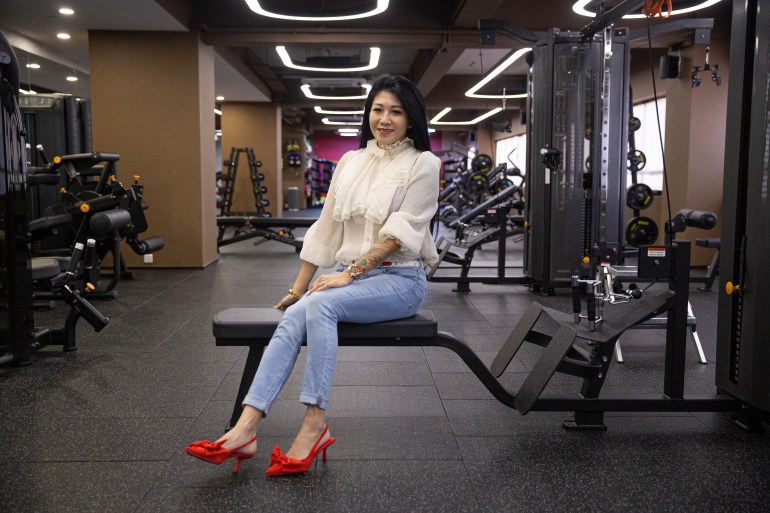
Hong Kong is grappling with a surge in daily infections, with cases rising above 1,500 on Monday. While other parts of the world are learning to live with the virus, the international financial centre has doubled down on a zero-tolerance strategy to align with mainland China.
The ultra-strict approach, which has helped the city report just 219 deaths, has forced authorities to impose increasingly draconian and costly measures amid the spread of the Omicron coronavirus variant, even as many health experts question whether elimination of the highly transmissible strain is even possible.
While the Omicron outbreak shows no sign of abating, punishing social distancing rules – the fourth such round for many businesses – are pushing local businesses to the brink.
Simon Wong Ka-wo, president of the Federation of Restaurants and Related Trades, has predicted an imminent wave of small business closures, with as many as 500 restaurants expected to shut in March. Other industry leaders have warned of skyrocketing unemployment.
Soon after the city announced a further tightening of curbs last week, Fitch Ratings slashed its economic growth forecast for the year in half to 1.5 percent, placing the Hong Kong economy among the weakest performers in the world. In recent weeks, prices of fresh produce such as meat and vegetables have soared due to truck drivers testing positive for COVID-19 at the mainland Chinese border.
International isolation
Cut off from the world due to travel bans and lengthy quarantines, foreign companies are leaving or relocating their executives as the former British colony’s international isolation nears the two-year mark with no end in sight.
Despite the mounting costs, the territory, which is facing growing pressure from Beijing to control the outbreak, has rejected calls to ditch or modify its “dynamic zero-covid” policy.
“The SAR government will definitely be steadfast in holding its principles to put people’s lives and public health at the forefront, with ‘dynamic zero’ as the aim,” Chief Secretary John Lee said on Saturday.
“This strategy is best suited to Hong Kong’s interests and the actual situation.”
Wilson Pang, a hairdresser, worked until midnight on Wednesday to serve dozens of customers, as people rushed to get a haircut before salons were forced to close for the next two weeks.
The 28-year-old, who sports a two-toned mullet, worked his way up from a teenage apprentice sweeping the floor to the proud co-owner of Le Huit 8, which has two branches in the New Territories, a district bordering Shenzhen.
Each branch costs 300,000 Hong Kong dollars ($38,457) a month in rent and each loses about 30,000 Hong Kong dollars ($3,845) in business each day.
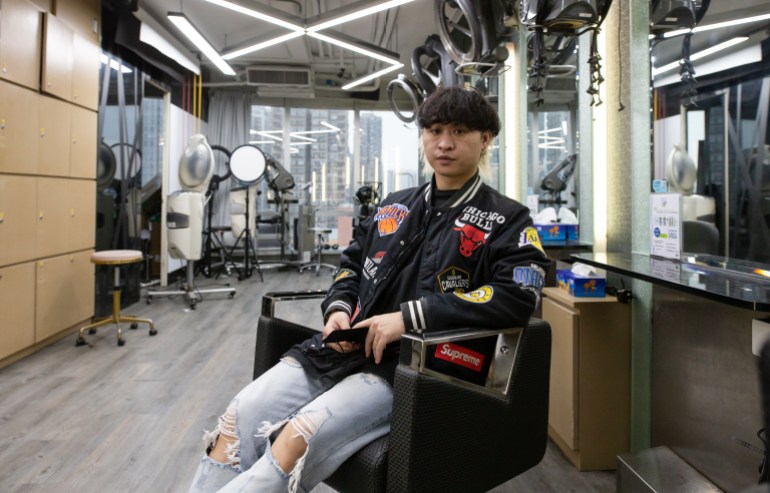
“If the suspension continues, 70 percent of the salons in Hong Kong would shut,” Pang told Al Jazeera.
Like most hairdressers, Pang has begun offering a home service, but he runs the risk of getting caught up in a snap apartment block lockdown or violating a ban on gatherings of more than two households.
Breaching social distancing rules carries a 10,000 Hong Kong dollar ($1,282) fine, which equals many hairdressers’ monthly base salary.
As it is common practice in the industry to pay employees in cash, many are unlikely to benefit from a 10,000 Hong Kong dollar ($1,282) government handout for those who lost their jobs.
“The lower you are in the system, the more you suffer,” Pang said.
Pang said the government had turned a blind eye to the plight of small businesses, and questioned whether there were political motives behind some of the measures introduced in the name of fighting the virus.
He said he feared that the introduction of a vaccine pass to enter restaurants, malls and public facilities would pave the way for a health code like the one in China, which tracks citizens’ location and determines where they can and cannot go.
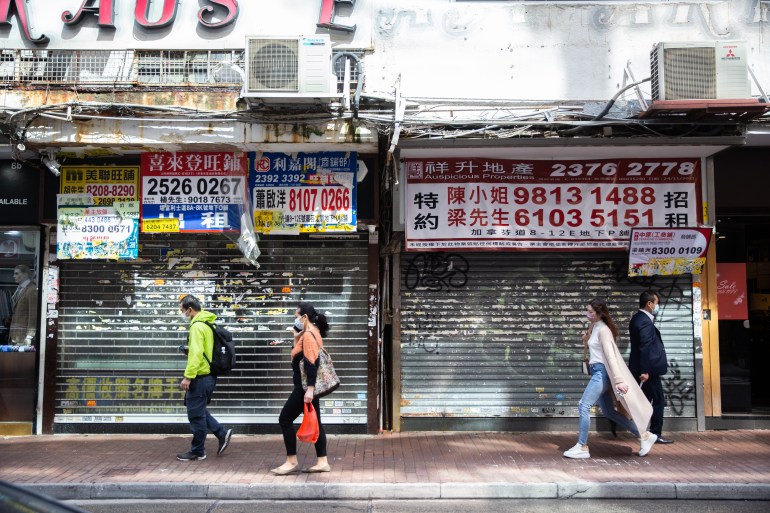
“It’s not the pandemic that’s scary,” said Pang. “It’s the political system.”
Across town, Ian Tsui and his business partner, Lam, owners of Japanese restaurant Shinko, have been ruminating about a difficult decision.
A 6pm curfew on dining in since early January has left their company in the red, with revenue plunging more than 80 percent.
Dealing a further blow, the cost of imported ingredients from Japan increased 20 percent last month, after a suspension in cargo flights disrupted supply chains.
With profit sometimes down to several thousand Hong Kong dollars a day, the pair believe they are better off closing their second branch in central Causeway Bay to cut their losses – which amounted to one million Hong Kong dollars last month.
But Tsui, who has spent time in prison, has hired people with criminal records to give others like him a second chance in life and is reluctant to let them go.
“They are not just my employees, they are my family,” Tsui told Al Jazeera.
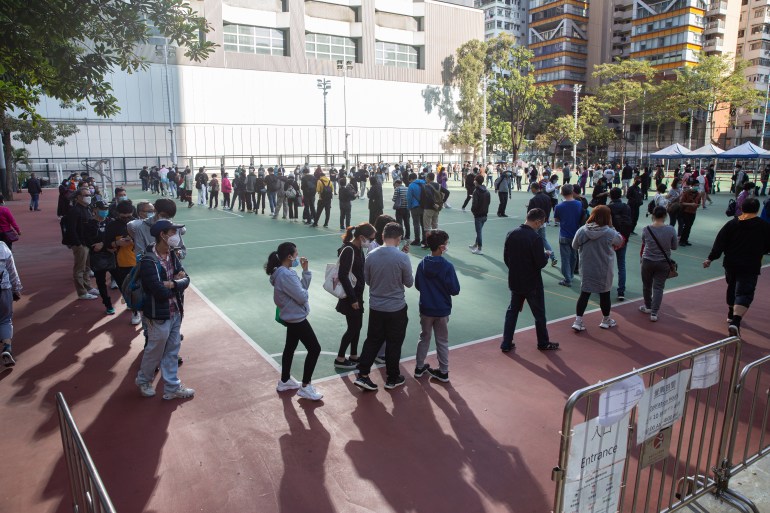
Tsui and his partner received 100,000 ($12,818) in subsidies last year as part of the government’s anti-epidemic fund, which covered only one-quarter of their monthly rent. Similarly, the latest round of handouts will provide little relief.
“I’d rather give that back in return for normal operations,” Lam told Al Jazeera.
Lam said many of the pandemic measures were ineffective and contradictory, such as the requirements for mandatory testing, which have resulted in thousands of people spending hours in queues where there is a risk of cross-infection.
Tusi and Lan estimate they can only survive another month before they will have to scale down the business.
“The saddest thing about Hong Kong is that you don’t see any hope, no matter what position you are in,” said Lam.
Like many others, Yeung’s patience is wearing as thin as her budget for contingencies.
“Even if we are allowed to open up, one single infection could set us back to square one,” said Yeung. “That’s the most frustrating aspect – you cannot see the light at the end of the tunnel.”